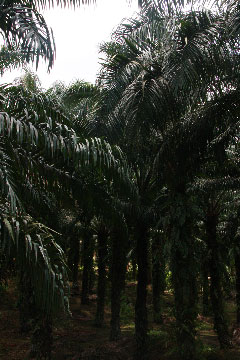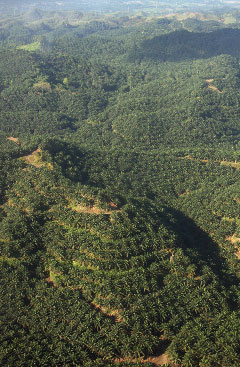Malaysian palm oil industry accused of child slavery by Indonesia
Malaysian palm oil industry accused of child slavery by Indonesia
mongabay.com
September 17, 2008
|
|
Indonesia’s Commission for Child Protection has accused Malaysia’s oil palm planters of enslaving migrant workers and their children at plantations in the state of Sabah on the island of Borneo, reports The Jakarta Post.
Arist Merdeka Sirait, secretary general of the commission, told the newspaper that a fact-finding team sent to Sabah discovered “tens of thousands of Indonesian migrant workers and their children had been ‘systematically enslaved,'” by Malaysian plantation owners.
“They are placed in isolated barracks with no access to transportation, making it impossible for them to leave the plantations. Nor do they have access to clean water, lighting and other facilities,” Arist told The Jakarta Post.
The children are not issued birth certificates depriving them of the right to formal education.
 Oil palm trees
|
“It is done deliberately so they’ll remain illegal and continue to serve as migrant workers, just like their parents. We call this ‘bonded labor’ (a means of paying off debt by direct labor rather than by currency or goods), and it is a modern kind of slavery,” he said.
Arist estimates that about 72,000 children of Indonesian migrant workers were forced to work without regulated employment hours at the Sabah plantations. He accused the Malaysian government of complicity in the debt-bondage scheme.
A Malaysian minister told the newspaper that it was looking into the allegations. He said the government would issue an official statement in coming days.
The employment of Indonesian migrants on Malaysian oil palm plantations is a standard industry practice. Few Malaysians are willing to work at the low wages offered to plantation workers.
The palm oil industry has been under fire of late by environmentalists who say oil palm expansion is driving large-scale conversion of peatlands and tropical rainforests. A number of campaigns in the United States and Europe have targeted products containing palm oil. At the some time producers are suffering from a 50 percent drop in the price of palm oil over the past few months.
The palm oil industry says that expansion has lifted rural populations out of poverty and provides jobs to migrants who lack other employment options. Some firms tout in-house education programs for workers’ children and promote new measures for reducing pollution from palm oil production.
Erwida Maulia. RI workers, children ‘enslaved’ in Malaysia, commission says. The Jakarta Post, Sept 17 2008
